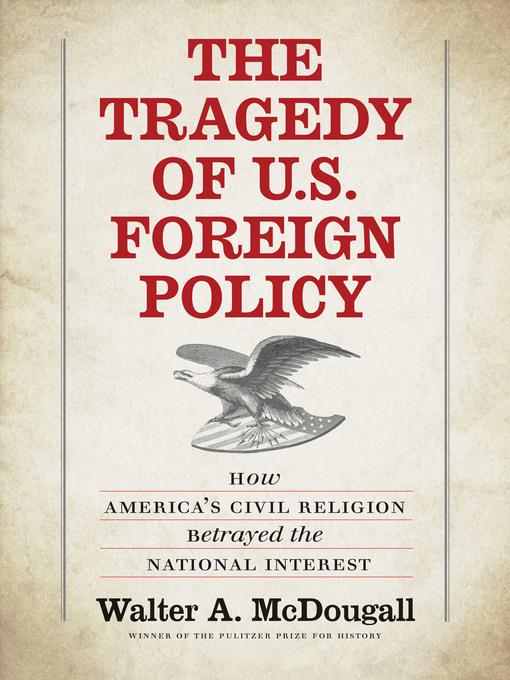
The Tragedy of U.S. Foreign Policy
How America's Civil Religion Betrayed the National Interest
کتاب های مرتبط
- اطلاعات
- نقد و بررسی
- دیدگاه کاربران
نقد و بررسی

October 24, 2016
McDougall, Pulitzer winner for The Heavens and the Earth, echoes the sentiments proffered by William Appleman Williams in his 1959 book, The Tragedy of American Diplomacy, wherein he lamented Americans’ failure to look inward and their habit of blaming outside forces for the nation’s difficulties. Hewing to a similar critical course, McDougall makes his bogeyman the nation’s non-sectarian civil religion: the belief that God (the god of all religions) smiles favorably on the U.S., especially on its interventions in others’ affairs. McDougall takes readers back to the Revolution, moving forward while positing that the conviction that the U.S. is somehow divinely protected from the normal vicissitudes of human life—a now-stale belief that was once benign and relevant to the nation early years—has been deeply injurious to the nation’s welfare. This was so from Washington’s farewell address and Jefferson’s “utopian temptation” though the era of Manifest Destiny and the Spanish-American War. It remains so with 21st-century efforts at regime change, which often results in engagement in unnecessary wars that endanger the national interest. McDougall is not incorrect, but many factors beside American civil religion have fueled American arrogance toward others. McDougall’s one-dimensional analysis makes his solid work less convincing than it could be.

Starred review from September 15, 2016
A Pulitzer Prize-winning historian examines the fanatical secular religion of American exceptionalism and why it is leading government officials and the electorate astray in an increasingly violent world.McDougall (History and International Relations/Univ. of Pennsylvania; Throes of Democracy: The American Civil War Era, 1820-1877, 2008 etc.) opens with the errors of the George W. Bush presidency based on American civil religion and closes with the errors of the Barack Obama presidency based on nearly identical misguided thinking. In between, he produces a mostly chronological tour de force highlighting the eras of George Washington, Thomas Jefferson, John Quincy Adams, Woodrow Wilson, Franklin Roosevelt, and John F. Kennedy. During the 1950s and '60s, Kennedy's Catholic faith certainly generated controversy, but McDougall is more interested in the young president's invocation of civil religion to justify his democracy's manifest destiny. At his inauguration, Kennedy stated that human rights derived not from compassionate governments but rather from the power of God. As a result, on God's Earth, the United States of America was required to further God's plan of individual freedom across national borders. Later in this impressive multicentury survey, McDougall demonstrates how both of Obama's inaugural ceremonies carried the American civil religion to a more pronounced zealotry in the fevered post-9/11 atmosphere. McDougall writes with admirable passion, but he never forgets to ground that passion in rigorous scholarship. Perhaps the only flaw--if it is, indeed, a flaw--is the author's high-flown, multisyllabic vocabulary, quite likely to send many readers to a dictionary. McDougall's scholarship does not lead him to upbeat prognostications about the future role of the U.S. in the global community. Instead, he predicts that further extensions of American exceptionalism could lead to the citizenry devouring itself on the global stage. A book remarkable for its depth, breadth, and intellectual daring.
COPYRIGHT(2016) Kirkus Reviews, ALL RIGHTS RESERVED.

























دیدگاه کاربران